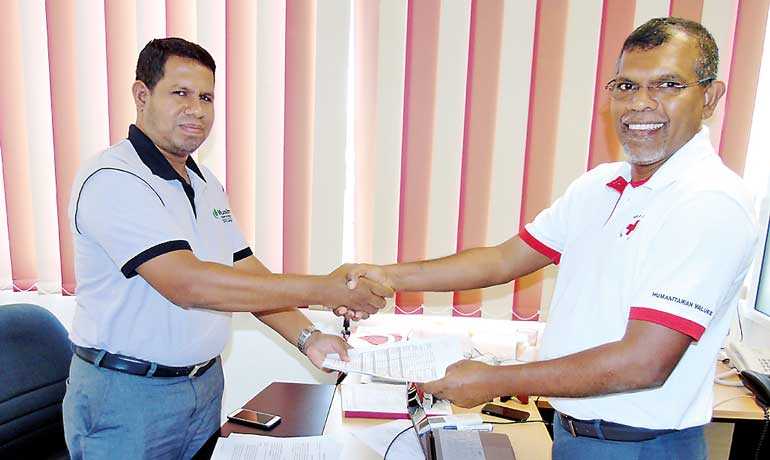Friday Feb 27, 2026
Friday Feb 27, 2026
Thursday, 13 June 2019 00:30 - - {{hitsCtrl.values.hits}}

Sri Lanka Red Cross Society (SLRCS) and Muslim Aid Sri Lanka (MASL) signed a Memorandum of Understanding (MOU) to collaborate on a program that will support the victims of the Easter Sunday Attacks. The MOU was signed by SLRCS Director General Dr. Mahesh Gunasekera and Muslim Aid Sri Lanka Country Director Faizer Khan. The main aim of this intervention is to provide humanitarian assistance to the victims through livelihood support, educational scholarships for affected students, medical support and psychosocial care.
On Sunday 21 April, Sri Lanka witnessed one of its darkest days in history. Six explosions ripped through the three churches and three luxury hotels in the country – namely, Katuwapitiya Church, Kochchikade Church, Zion Church in Batticaloa, the Shangri-La Hotel Colombo, the Cinnamon Grand Hotel, and the Kingsbury Hotel, Colombo. The bombings were a result of a heinous suicide attack – which was later revealed to have been carried out by a radical Islamist terrorist group, who carried out coordinated suicide bombings. The attack took the lives of 321 people and injured over 500.
MASL will work through this partnership with the Gampaha Branch of Sri Lanka Red Cross Society to reach the victims of this violence in Katuwapitiya, Negombo. The project, funded by Muslim Aid USA, will channel its assistance to meet the medium and longer-term needs of the victimised families. The project will take a holistic approach in assisting our beneficiaries in that not only the material benefits will be provided to regain their lives, but it will also cater to their physical, mental and spiritual wellbeing. The project is a targeted plan of response for these families and intends to bring the necessary assistance over 100 such families.
There are many children who lost their parents or families who lost their breadwinners. Therefore, this relief project has encompassed both the provision of educational assistance by way of scholarships and livelihood assistance through the facilitation of self-employment, to alleviate their suffering. Both MASL and the SLRCS will also make use of this opportunity to develop social cohesion among different ethnic communities in the area, through the strengthening of interfaith initiatives - since the long run, both organisations plan to work towards peace building and coexistence among communities in Sri Lanka.